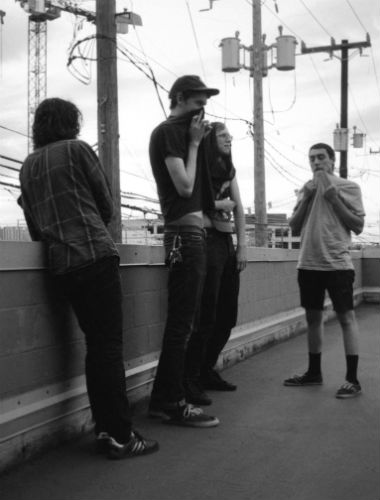
Total, the debut from Portland’s Hausu, comes at your in roaring waves of guitars. It’s a strand of postpunk with more than a few traces of Unwound and Sonic Youth in the mix, ably blending furious guitars with more trance-inducing qualities. It’s also an impressive internalization of a sound that debuted long before this group’s members, all of whom are in their early twenties, were born. Making the familiar both your own and fresh is no small feat, and I checked in with guitarist Ben Friars Funkhouser about the group’s recent tour, their aesthetic inspirations, and more.
Your bio mentions that all of you were born in the early 90s; is that what “1991-2091” takes its title from? What does the century mark represent to you?
This actually addresses an important part of our group. Those two seemingly-connected bits of information, gleaned from official sources, are among the tools that curious listeners or music writers have to formulate a deeper picture of the band. Our goal however, is not to make anything easier, but the opposite. The connections between points of reference, such as the song title and our birthdays, are more obscure.
Many writers have us pegged as a 90s-obsessed band. While it would be untrue to claim that the music (and visual arts) movements of the 90s are irrelevant, it seems equally useless to settle with Pavement or Dinosaur Jr as some have chosen to.
“1991-2091” is a name with many possible interpretations. We’ve considered: the extension of human lifespan via medicine/technology, the dangers (both physical and symbolic) accompanying the turn of the millenium, how addiction and self-destruction tap into a greater entropic current
How has the summer tour gone so far?
Tour just ended about a week ago, with our “return” show last night. Was vvvvv. cool. The stars shined friendly light on our van, encouraged police to leave us alone, and brought many cool and inspiring people to our shows. None of us had ever toured that far, maybe a couple of west coasts, but nothing on that scale. When we got used to the routine of waking up hella early, eating a bagel or nothing, and taking off to another city, it began to feel calming. Obviously shitty sleep and no food sucks, but tour also felt more “real” than when a monotonous school or work schedule defined our lives.
Does the band’s name come from the Japanese horror film?
Interestingly enough, it is a coincidence. One night in the late fall, the four of us were on Elk Rock in Milwaukie, OR. We had brought a generator out to the rocky island and were attempting to pirate a WiFi signal in order to play Runescape together. After moving about, we were able to tap into a signal named Miles’ Sexual Aggression Outlet,” and quickly began playing. One hour later, the signal shut off and our screens went black. Looking up at one another, startled by the deep darkness, we felt an intense connection. Then, the number series “639078” appeared on each computer. We packed up, and after arriving back at one of our houses, put the phrase into a number decoder. The word “Hausu” came out.
You have Elizabeth Freeman’s Time Binds: Queer Temporalities, Queer Histories recommended on your website. Does your reading generally lean towards the academic?
During the school year it is almost exclusively so. The link to Time Binds is special. I felt like the essay “temporal drag” indirectly touched upon some of the issues at stake to our band as a rock band.
What else are you reading these days?
On tour we read Don DeLillo’s White Noise, William T. Vollmann’s Rising Up and Rising Down, Ryunosuke Akutagawa’s Hell Screen / Cogwheels and suicide letters, Camus’ La Peste, Chris Kraus’ Summer of Hate, Burroughs’ Junky among others.
Photo: Trevor Crump
Follow Vol. 1 Brooklyn on Twitter, Facebook, Google +, our Tumblr, and sign up for our mailing list.
